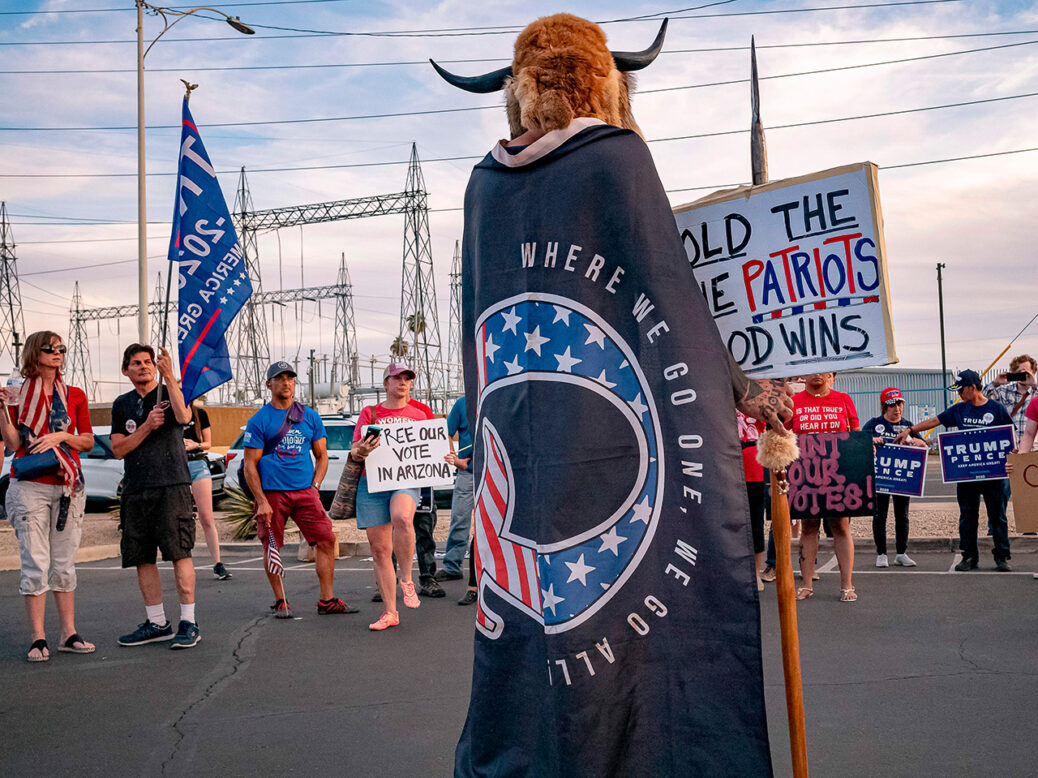
Two weeks ago, on Saturday 18 March, Donald Trump posted on his social media network Truth Social (caps lock on, naturally): “THE FAR & AWAY LEADING REPUBLICAN CANDIDATE AND FORMER PRESIDENT OF THE UNITED STATES OF AMERICA, WILL BE ARRESTED ON TUESDAY OF NEXT WEEK. PROTEST, TAKE OUR NATION BACK!”
There was an eerie circularity to the post. Five years earlier, in October 2017, a person calling themselves “Q” posted a message on 4chan, an obscure site frequented by far-right meme merchants. They predicted the imminent arrest not of Trump, but of his bitter foe, Hillary Clinton. It was the first post in what would become QAnon – a cult-cum-conspiracy-theory-of-everything which held that Donald Trump was fighting a Deep State cabal of Satan-worshipping paedophiles in a defining battle between good and evil.
It is a little disconcerting to note that while Q’s prediction has not come to pass, Donald Trump’s soon will.
Trump, infamously, winked at QAnon believers during the 2020 presidential campaign (“I don’t know much about the movement other than I understand they like me very much”). A few weeks later, a survey found that a majority of Republicans thought the QAnon conspiracy theory was partly or mostly true. On 6 January 2021, the narrative about a malevolent Deep State plot to usurp Trump and steal the White House drove a mob into the Capitol in Washington DC. QAnon had reached the mainstream.
So much for ancient history. Now, as America contemplates the imminent arrest of its 45th president – the fingerprints, the mugshots, perhaps even the handcuffs – there are many who believe this is, finally, justice being served. Al Capone went down for tax evasion. With Trump it’s hush money to a porn star. It’s not the charges that matter – so the thinking goes – it’s seeing him in the dock.
[See also: Donald Trump tried to turn his first 2024 campaign rally into a religious experience]
But in the world of QAnon, which has morphed and grown into the Make America Great Again (Maga) wing of the Republican Party, this spectacle will bolster the very narrative that the conspiracy conjured up: that the corrupt establishment has turned the might of the American legal system against its political enemies.
In September, at a conference in Florida for nationalists and conservatives, I met people who told me those serving jail time for their part in the events of 6 January 2021 were “political prisoners”. They said that the majority had been convicted not of violence but of trespass, and had received unusually high sentences. Some had been held in solitary confinement: they weren’t wrong. Everything in America is part of the culture wars now, and the image of a Trump supporter alone in a jail cell was as powerful to them as the pictures of rioters storming the Capitol were to the other side. Both the crime and the punishment had been reduced to symbols.
At that same conference in Florida people talked about the American establishment’s role in spreading doubt about the contents of a hard drive purported to have come from the laptop of Joe Biden’s son Hunter. Documents on the drive appeared to suggest Hunter was using his father’s position as vice-president to further his own business deals in countries such as Ukraine and China. “Fake news” shouted the establishment media (not unreasonably – the drive was being peddled by Steve Bannon and Rudi Giuliani). “Russian disinformation,” said a group of 50 former senior CIA and National Security officials. The FBI told Twitter and Facebook to be on the lookout for disinformation, and the platforms duly suppressed the story two weeks before the 2020 presidential election. But it turned out the laptop was real. And in Maga-land, they saw the contours of a conspiracy – one that might have deprived Trump of a second term.
In the 1990s, Bill Clinton’s enemies charged that he was using the FBI, the Justice Department and the IRS for political ends. There is nothing new about the idea of American justice being used as a tool by those in power. This fear has run like a thread through the politics of the past three decades, at first on the fringes, giving birth to odd conspiracy theories and militia movements. Now it has arrived in the mainstream of American politics.
After the FBI raided Donald Trump’s home at Mar-a-Lago last August, his long-time adviser Roger Stone said a group of politicised thugs were using the FBI as “Joe Biden’s personal Gestapo”. That statement, outlandish and hyperbolic as it may seem, chimed with many in Florida. A survey at the time suggested more than half of Americans agreed.
Not everyone I met in Florida was a Trump supporter. What his arrest might do to his chances of running in 2024 is, in a way, irrelevant. Donald Trump, too, has become a symbol. When he walks into a police station in New York – as he likely will next week – it will confirm a suspicion held by millions: that the instruments of American justice have been captured and weaponised by a corrupt cabal that will stop at nothing to cling to power. In addition, these people believe the 2020 election was stolen and that their democracy is broken; they believe, therefore, that they cannot dispose of their malevolent leaders at the ballot box. Oh, and many of them own guns. Dangerous times.
[See also: The Great Reset: Britain will keep getting weirder]



